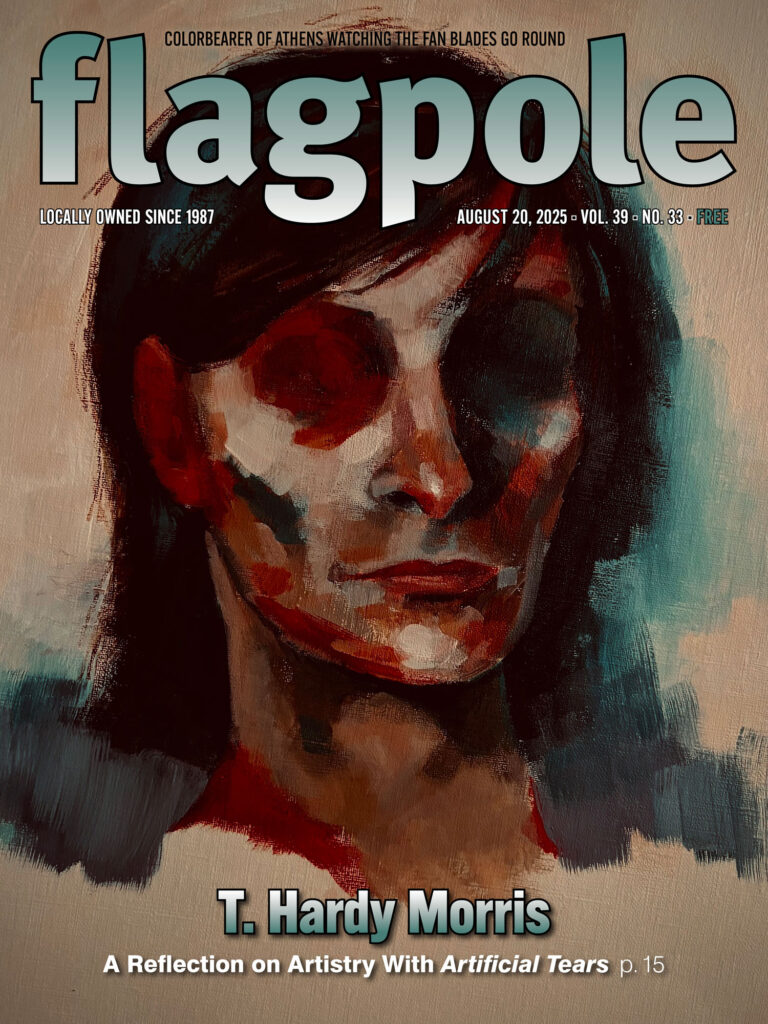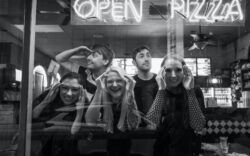When T. Hardy Morris started putting together bands with high school friends—which snowballed into decades of writing songs, recording albums and touring—he never intended to be an entertainer. But that’s exactly where he found himself years later, an artist in the middle of the entertainment business figuring out what that meant.
Earlier this month Morris released his album Artificial Tears, courtesy of New West Records imprint Normaltown Records, as an existential exploration of the differences between art and entertainment. Following his 2021 release, The Digital Age of Rome, which was a commentary on living in a world perpetually on the edge of extinguishing itself, Morris continues to flex masterful songwriting imbued with impactful meaning inside of hazy, raw rock-and-roll tracks.
“Some of the theme kind of gets explored by having done this a long time and written a ton of music and performed a ton of music, and just kind of leaning into that and reminding yourself that you can still, you know, be an artist and a creator without it having to be entertainment, right? There’s a difference. And you have to remind yourself that as an audience member, too,” says Morris.
The 12-song album was produced and mixed by Carl Broemel of My Morning Jacket. Initially Morris set off for Broemel’s home studio in Nashville without a concrete plan for an album, and the two recorded several demos on a four-track machine as a casual session. They already had some time booked at a professional studio, so they took some songs there to record with a full band, but ended up only pulling some of those into Artificial Tears.
“We wound up using some of the stuff from the demo session just because I really liked the way it sounded, and I liked the way it felt, and I liked his little studio,” says Morris. “Kind of based on the sonics of that place, and the little setup that we had going, it made me be like, what if we tried a few older songs that I had never really tried in a studio before. I thought they would fit that scenario, and I like the way they came out. Then I wrote some new songs, too, just based on kind of how it felt in there.”
The difference in recording atmospheres between Broemel’s home studio space and the professional studio with more cooks in the kitchen reflects that idea of art versus entertainment, and it came through organically in the process. Morris explains that pulling songs from the two different places is why the album doesn’t have a very uniform sound, but the louder, fuller sounding band tracks and quieter, contemplative stripped down tracks represent the two sides of Morris as a musician.
When performing live, Morris has full band sets that deliver that loud and in-your-face sound expected in the rock-and-roll world, but he also performs more intimate solo sets that are quieter and smoother in tone more akin to a conversation with his audience.
“I just kind of lean into those dynamics. There’s a lot of great songwriters and music I love that’s really chill and intimate and quiet, and then there’s a lot of stuff I like that’s real loud,” says Morris. “I don’t really rely on set lists very much. I have a ton of songs from all the albums and things I’ve done, and so I kind of just lean into whatever I’m feeling that night. I let what it feels like in the room and on stage kind of dictate where it goes.”
Athens audiences will have the opportunity to catch both sides of Morris this fall. On Friday, Sept. 26, Morris will perform with a full band at Flicker Theatre and Bar as part of The Pink Stones’ album release show that night. Then he will perform a solo set at Hendershot’s on Friday, Oct. 10 with Asheville musician Tyler Ramsey.
From creating an album out of the aimless joy of recording music to a finished product that manages to polish the fragmented aspects of Morris’ musical identity, so much about Artificial Tears creates an example out of itself for the case of art versus entertainment. And that even includes its visual representation.

T. Hardy’s mother Lillie Morris, a visual artist and musician, accidentally painted what became the Artificial Tears album cover, also featured on the cover of this week’s Flagpole. Known for her collage work and abstract landscapes, T. Hardy explains that she enjoys the emotive side of abstract art. However, this painting was meant to be something entirely different, and not necessarily to share.
“Basically, it was like an art exercise where you’re supposed to paint an abstract version of a face, but the face is not supposed to be recognizable. She sent me that picture and was like, ‘I obviously failed miserably at this art exercise.’ And I was like, ‘Well, I love it. Thanks for the album cover,’” says Morris.
As often happens, over the span of time it’s taken to release this album Morris has already been amassing a collection of newly written material and tracking old songs. So while everyone around him celebrates this new release, his eye is already toward the future.
“It did feel a bit like a nice addition to the catalog of solo records I’ve done already. It feels real in line with all those things in a good way. I think it holds up against all the other solo records I’ve done. And I’m kind of interested in the next one being like, maybe that was the last one of that chapter, right? But definitely not the end of the book,” says Morris.
Like what you just read? Support Flagpole by making a donation today. Every dollar you give helps fund our ongoing mission to provide Athens with quality, independent journalism.










